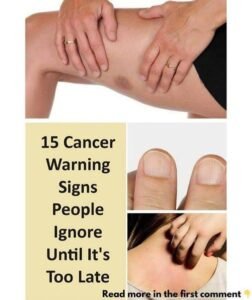15 Cancer Warning Signs People Ignore Until It’s Too Late
 15 Cancer Warning Signs People Ignore Until It’s Too Late
15 Cancer Warning Signs People Ignore Until It’s Too Late
Early detection of cancer can significantly improve survival rates, yet many people overlook subtle warning signs. Recognizing these signs can lead to earlier diagnosis and better outcomes. Below are 15 symptoms that people often ignore, which could indicate cancer:
1. Unexplained Bruising
Frequent or unexplained bruising, especially on areas like the thighs, may indicate blood-related cancers such as leukemia. If bruising appears without injury, consult a doctor.
2. Changes in Nails
Dark streaks, ridges, or unusual discoloration of nails can be early signs of skin cancer or other internal malignancies. Pay attention to persistent changes in your nails.
3. Persistent Itching
Chronic itching, especially without a known cause, can be linked to cancers such as liver or lymphatic cancers. Skin changes or persistent scratching deserve medical evaluation.
4. Unexplained Weight Loss
Losing weight rapidly without trying can be a sign of cancers like pancreatic, stomach, or esophageal cancer. This symptom is often one of the first noticed in advanced stages.
5. Fatigue
Severe or chronic fatigue that doesn’t improve with rest might signal blood-related cancers or colon cancer. It’s more than just being tired—seek medical advice if fatigue persists.
6. Skin Changes
New moles, sores that don’t heal, or changes in existing moles could be a sign of melanoma or other skin cancers. Skin discolorations or reddened patches should not be ignored.
7. Chronic Cough or Hoarseness
A persistent cough lasting more than a few weeks, especially if accompanied by blood, may signal lung or throat cancer.
8. Unusual Bleeding
Bleeding between periods, rectal bleeding, or blood in the urine are serious signs and could point to cancers like uterine, colorectal, or bladder cancer.
9. Lumps or Swellings
New lumps, especially in the breast, armpits, or neck, could indicate breast cancer, lymphoma, or thyroid cancer. Any persistent swelling should be investigated.
10. Difficulty Swallowing
If swallowing becomes painful or difficult, it could be a sign of esophageal or throat cancer. Persistent issues in this area warrant immediate attention.
11. Persistent Bloating
Ongoing bloating, particularly in women, may be a sign of ovarian cancer. If bloating persists for weeks, consult a specialist.
12. Persistent Pain
Unexplained pain, especially in the abdomen, back, or bones, might indicate cancer. Chronic pain without a clear cause should be evaluated by a healthcare professional.
13. Changes in Bowel or Bladder Habits
Long-term constipation, diarrhea, or changes in stool color or size may indicate colorectal cancer. Changes in urination frequency or pain could also suggest bladder cancer.
14. Sores That Don’t Heal
Persistent sores in the mouth, on the skin, or other areas might point to oral or skin cancers. Non-healing wounds should always be checked.
15. Unusual Sweating or Fever
Excessive sweating, especially at night, or persistent fever might indicate leukemia or lymphoma. Monitor your body’s unusual responses and seek medical care.
What to Do if You Notice These Signs
If you experience any of these symptoms persistently, consult a healthcare professional immediately. While these signs don’t always indicate cancer, early screening and diagnosis can save lives. Prioritize your health and pay attention to your body’s warning signs.

